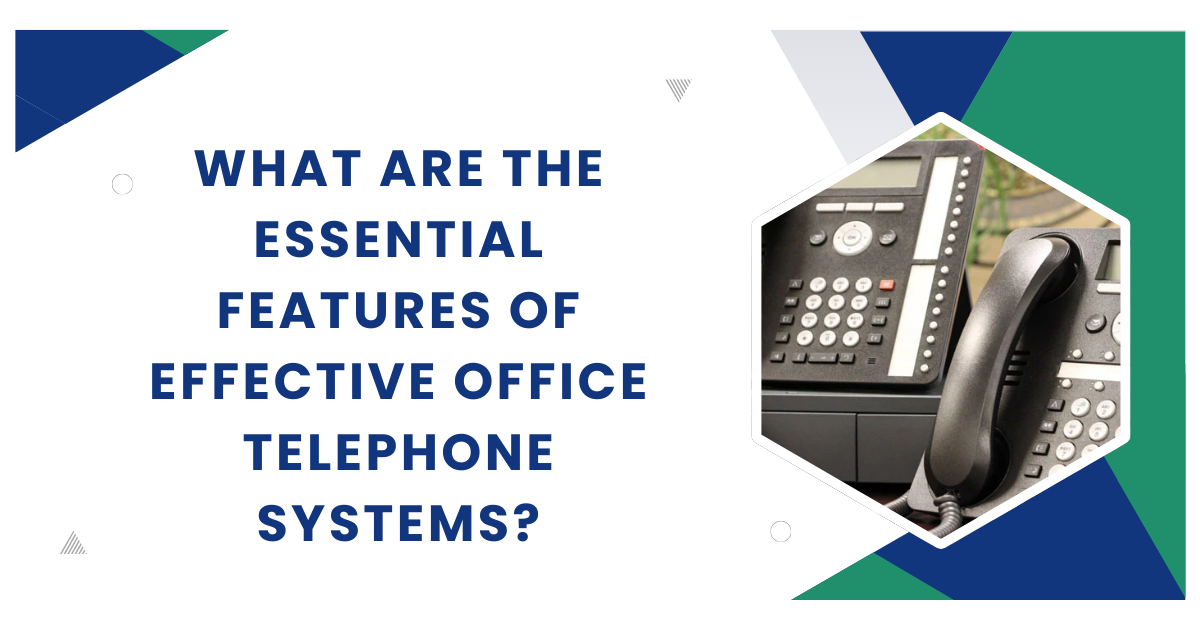In today’s fast-paced business world, having an effective office telephone system is essential for smooth communication. Whether you run a small startup or a large corporation, the right telephone system can enhance productivity, improve customer service, and streamline internal operations. In this blog, we will explore the essential features of effective office telephone systems that can help your business thrive.
Understanding Office Telephone Systems
Before diving into the features, let’s first understand what an office telephone system is. An office telephone system is a set of devices and technology that allow employees to communicate with each other and with clients. These systems can vary greatly in terms of capabilities, from simple landline phones to advanced Voice over Internet Protocol (VoIP) systems.
Types of Office Telephone Systems
- Landline Systems: Traditional telephone systems that use copper wires. They are reliable but can be limited in features.
- VoIP Systems: These systems use the internet to make calls. They are more flexible and often come with many advanced features.
- Virtual Phone Systems: A cloud-based service that provides a business number without the need for physical hardware.
Note – For businesses seeking to enhance their communication capabilities, investing in reliable Office Telephone Systems is crucial. SoyuzTech Trading offers a range of solutions tailored to meet diverse business needs. Explore the various options available and elevate your office communication
Essential Features of Effective Office Telephone Systems
1. Call Forwarding
Call forwarding is a vital feature that allows calls to be redirected to another number. This is useful when employees are not at their desks or are working remotely. With call forwarding, you ensure that important calls are never missed, which helps maintain excellent customer service.

Key Benefits of Call Forwarding:
- Increased Accessibility: Employees can take calls anywhere, which is crucial for remote work.
- Improved Customer Service: Clients can reach someone even if their primary contact is unavailable.
2. Voicemail
Every office telephone system should have a voicemail feature. Voicemail allows callers to leave messages when the recipient is unavailable. This ensures that important information is not lost.
How Voicemail Helps:
- Record Important Messages: Employees can retrieve messages later and respond accordingly.
- Professional Image: Having voicemail presents a professional image to clients.
3. Call Screening
Call screening allows employees to identify who is calling before answering. This feature helps manage incoming calls effectively, ensuring that urgent matters are prioritized.
Advantages of Call Screening:
- Time Management: Employees can choose which calls to answer, minimizing distractions.
- Enhanced Productivity: Important calls get immediate attention while others can be scheduled for later.
4. Conference Calling
Conference calling is a crucial feature for businesses that often hold meetings with multiple participants. This feature allows several people to join a call, making it easier to communicate with teams, clients, or partners.
Benefits of Conference Calling:
- Facilitates Collaboration: Teams can work together regardless of their physical locations.
- Cost-Effective Meetings: Reduces the need for travel, saving time and expenses.
5. Call Analytics
Call analytics provide insights into call patterns, such as the number of calls made, received, and missed. Understanding these metrics can help businesses improve their communication strategies.
Importance of Call Analytics:
- Identify Trends: Businesses can analyze peak call times to allocate resources effectively.
- Improve Customer Experience: By understanding call patterns, businesses can enhance their service quality.
6. Automated Attendant
An automated attendant is a system that provides callers with options on how to direct their calls. This feature allows callers to reach the right department or individual without the need for a receptionist.
How Automated Attendant Helps:
- Streamlines Call Management: Reduces the workload on receptionists.
- Enhances User Experience: Callers can navigate the system quickly.
7. Integration with Other Tools
An effective office telephone system should integrate seamlessly with other business tools, such as customer relationship management (CRM) software. This integration enhances communication and helps track interactions with clients.
Benefits of Integration:
- Improved Efficiency: Employees can access customer information while on calls.
- Enhanced Collaboration: Teams can work together more effectively when tools are integrated.
8. Mobile Compatibility
With the rise of remote work, having a telephone system that is compatible with mobile devices is crucial. This feature allows employees to make and receive calls from their smartphones using the office number.
Why Mobile Compatibility Matters:
- Flexibility: Employees can work from anywhere while maintaining a professional presence.
- Increased Responsiveness: Quick access to calls ensures timely communication.
9. Call Recording
Call recording is a feature that allows businesses to record phone conversations. This can be beneficial for training purposes, quality assurance, and dispute resolution.
Benefits of Call Recording:
- Training Tool: New employees can listen to past calls for training.
- Quality Assurance: Businesses can monitor calls to maintain service standards.
10. Scalability
As your business grows, your telephone system should be able to grow with it. Scalability is an essential feature that allows businesses to add new lines and features as needed.
Importance of Scalability:
- Future-Proofing: A scalable system ensures that you won’t need to replace your entire setup as your business expands.
- Cost-Effectiveness: Investing in a scalable system saves money in the long run.
Choosing the Right Office Telephone System
Assessing Your Needs
Before selecting an office telephone system, assess your business needs. Consider factors such as:
- Number of Employees: Determine how many lines and features you require.
- Budget: Establish a budget for your telephone system.
- Future Growth: Think about how your needs may change as your business grows.
Research and Compare
Once you understand your needs, research various telephone systems. Compare features, pricing, and customer reviews. Look for systems that offer the essential features discussed above.
Consult with Experts
If you’re unsure about which system to choose, consider consulting with telecommunications experts. They can provide valuable insights and recommend the best solutions for your business.
Conclusion
An effective office telephone system is vital for any business that values communication. By understanding and implementing the essential features discussed in this blog, you can enhance your office’s communication capabilities. Remember to assess your needs, research your options, and choose a system that can grow with your business. Investing in the right telephone system today will pay off in the long run through improved productivity and customer satisfaction.
By focusing on these key features, your office telephone system can serve as a powerful tool to drive your business forward.
For more insightful articles related to this topic, feel free to visit bloggingleads.com





